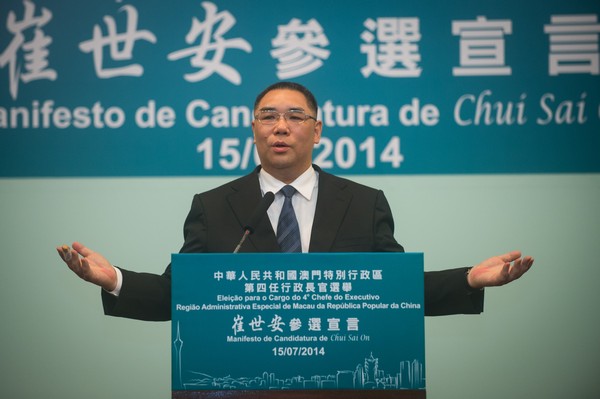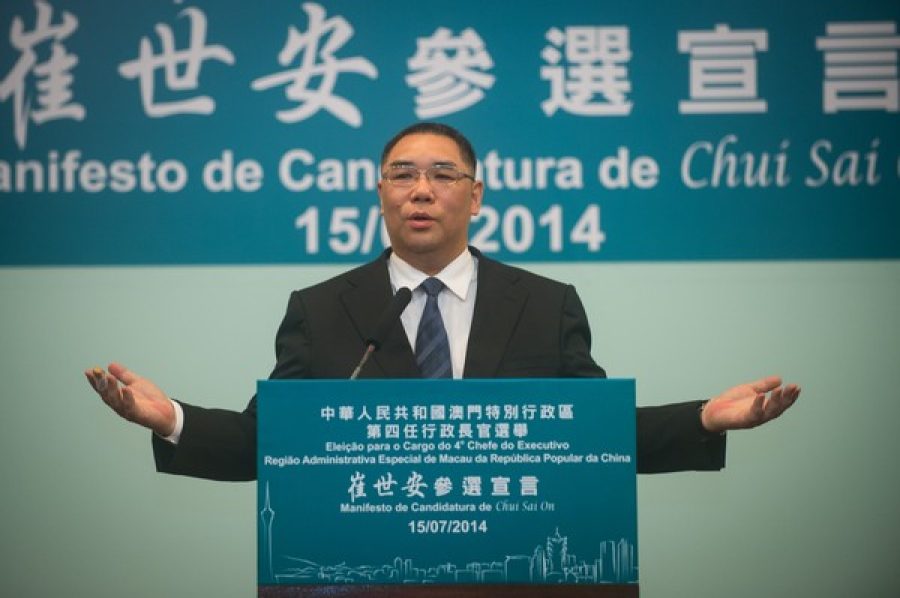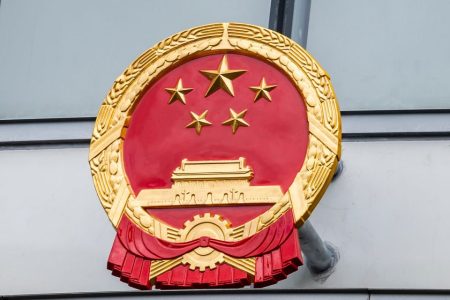Chief Executive Fernando Chui Sai On said in his re-election manifesto Tuesday that he will give “priority to issues concerning people’s livelihoods, such as housing, transport, environmental protection, social security and human resources.”
The 57-year-old public health expert made the pledge during a press conference about his re-election bid at the Macau World Trade Centre .
His election manifesto was presented in Chinese, Portuguese and English. However, English was provided only as reference, considering that it is not an official language in Macau.
Chui, who was born in Macau and obtained his master’s degree and PhD in Public Health from the University of Oklahoma, also promised to speed up administrative reforms and “build a clean and efficient government.”
Chui’s current 5-year term ends at midnight on December 19. The Basic Law allows him to seek re-election for one consecutive term. The chief executive election will take place on August 31.
Chui, an ex-principal of Kiang Peng School and former lawmaker, also said his government would encourage the “stable” development of democracy and promote the rule of law and the city’s sustainable economic development.
The chief executive, who served as policy secretary for social affairs and culture for a decade under his predecessor Edmund Ho Hau Wah, also said he would make joint efforts with Macau people to “achieve lasting stability, peace and harmony in our society.”
Chui, who took up his current position on December 20, 2009, also said that he had a “fearless sense of duty”.
He pledged “stringent compliance” with the Macau Basic Law and the “One Country, Two Systems” and “Macau people ruling Macau” principles, based on the special administrative region’s “high degree of autonomy.”
“These advantageous policies will lead us the way to happiness and prosperity,” Chui said.
“As always, I will strive to unconditionally protect the national interests of sovereignty, security and development, and maintain Macau’s long-term development,” Chui said.
The chief executive also said he understood “that the realisation of the Chinese Dream for the great rejuvenation of the Chinese people is closely linked to the realisation of the desire to have a better future for Macau.”
When launching the concept last year, President Xi Jinping described the Chinese Dream as “national rejuvenation, improvement of people’s livelihoods, prosperity, construction of a better society and military strengthening.”
Chui also said that as a Chinese citizen he was determined to use his “diligence and wisdom to serve the motherland and Macau.”
The chief executive, who is an honorary vice-president of the Chinese Preventive Medicine Association, acknowledged that “heavy responsibilities rest on my shoulders.” However, he was quick to add that he was looking to continuously contribute with his “wisdom, abilities and experience… to carry out reforms and continuous innovation.”
Chui also said he understood that Macau “people have high expectations for a peaceful living and working environment and an optimised ecological environment,” adding that “their longing for a good life is the responsibility on our shoulders and the goal to strive for.”
The chief executive also said that “human-centred governance requires us to accept suggestions from the public.”
Chief Executive Fernando Chui Sai On said he was willing to convey locals’ opinions on the city’s political reform to the central government in Beijing, stressing that only the central government has the authority to start any political reform process in Macau.
Chui also urged locals to remain peaceful and rational when protesting or demonstrating to express their views.
He made the remarks during a press conference at the Macau World Trade Centre which he hosted to announce his election manifesto.
During the 45-minute-long press conference, Chui answered questions raised by nine reporters from Macau, Hong Kong and the mainland about various issues including how he evaluates his performance over the last four years, on social issues such as public housing, regional co-operation, any changes in his five-member team of policy secretaries, democratic development, gaming concessions and sub-concessions, and whether his reelection bid will be affected by a controversial perks bill although his government finally decided to axe it.
Responding to reporters’ questions on whether he would promise to give a boost to the city’s political reform process leading to universal suffrage, Chui said that different regions and countries were in various stages of their political development
“In Macau it must be in line with the Basic Law and Chief Executive Election Law…if opinions are collected [about the democratic reform process], being the chief executive I would be pleased to pass them on to the central government,” Chui said.
The chief executive added: “I am willing to listen to, share, talk and discuss [the opinions]. It is very clear that only the central government has the authority to start the procedure and make any decision [regarding the matter].”
Chief Executive Fernando Chui Sai On said yesterday he was will-ing to convey locals’ opinions on the city’s political reform to the central government in Beijing, stress¬ing that only the central government has the authority to start any political reform process in Macau.
Chui also urged locals to remain peaceful and rational when protesting or demonstrating to express their views.
When asked as to how he would solve the city’s housing problem if he was re-elected, Chui said that “[the construction of] public housing is a big concern that needs to be tackled.” He said that he would con¬tinue to give top priority to solving the city’s housing problem.
Chui said there were two measures to tackle [the housing problems] “… one to increase the number of public housing flats to 28,000 to be built in Zone A [which is still being reclaimed] and to build enough public facilities and traffic networks and job opportunities there,” Chui said.
He said the second measure was that he had decided that all idle land repossessed by the government would be used for the construction of public housing flats as a matter of priority.
Civic leaders have repeatedly slammed the government for its failure to tackle the city’s severe hous¬ing problem, namely by not building enough public housing units.
The government’s public housing programme comprises subsidised home ownership scheme (HOS) flats and low-rental social housing flats.
Analysts say that over 90 per-cent of the population are no longer able to buy a flat in the private housing market.
Chui also promised to come up with a “really long-term” housing policy, based on data about the amount of land reserved for public housing and the redevelopment of the city’s old quarters.
Responding to reporters’ questions about the government’s ill-fated perks bill, which the government withdrew after two large protests, Chui said the public should think about the need for a system to provide financial guarantees to retired principal officials.
Observers have pointed out that Macau – one of the world’s richest cities – still does not have a comprehensive retirement system for its residents.
“I don’t think it [the bill] will affect my re-election bid… I do my work with sincerity,” Chui said.
When asked for his comments on his performance over the past five years, Chui said he believed history will tell if he did well or not.
“I hope I will be given an opportunity. . .to continue serving the public for another five years,” Chui said.
Chui also said that after his second five-year term – if he is re-elected next month – he would like to either be involved in research or take part in social work.
Meanwhile, government-appoint¬ed lawmaker Vong Hin Fai, the “mandatary” (legal representative) of Chui’s electoral affairs, said yesterday morn¬ing that Chui had already obtained the support of about 50 members of the 400-head Chief Executive Election Committee. He vowed to obtain as many nominations as he and Chui’s campaign team could get.
Chui must be endorsed by at least 66 members of the committee for his candidacy to be officially recognised.
Chui remained tight-lipped on any changes in his five-member team of policy secretaries, saying that now was not the right time to talk about.
Policy secretaries’ appointment must be green-lighted by the central government.
There is speculation that at least two secretaries – Secretary for Administration and Justice Florinda Chan Lai Man and Secretary for Economy and Finance Francis Tarn Pak Yuen – will retire later this year. Both have been in their posts for 15 years.( macaunews/macaupost)






